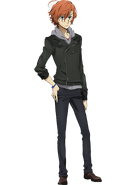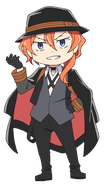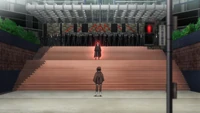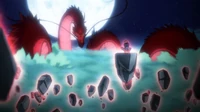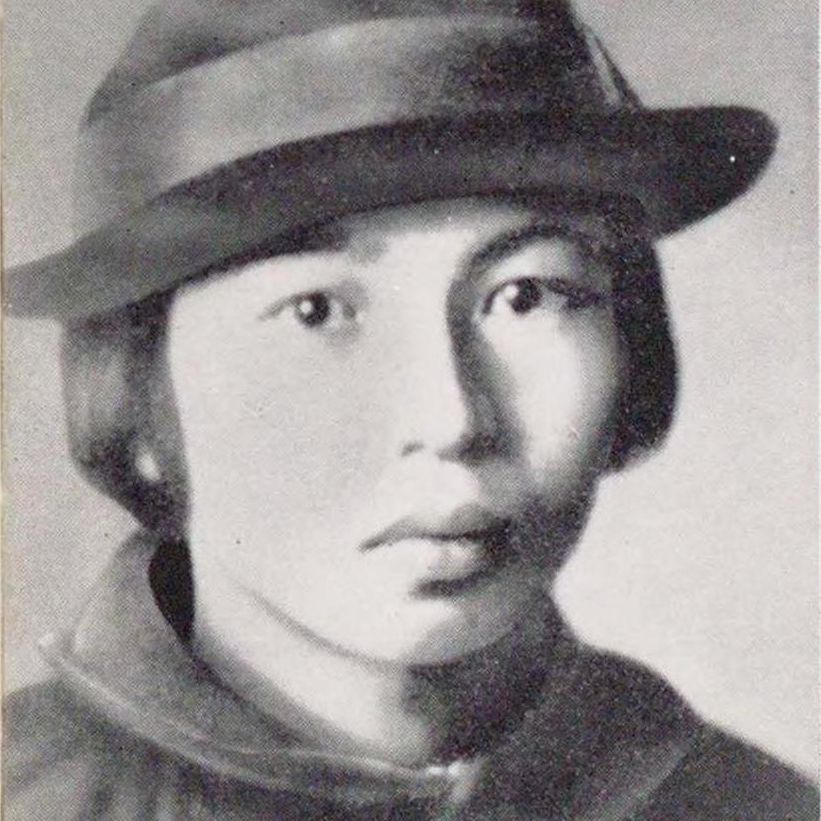- Main
- BEAST
- This article is about the implied original. For the clone of the same name, see Chūya Nakahara (Clone).
Chūya Nakahara (
Appearance
Chūya is quite short with a petite, yet muscular build. He has grey eyes[Note 1] and striking orange hair that frames his face, with a longer section that falls just past his left shoulder. He wears a black hat with a red hatband and a thin silver chain that hangs over the brim.
His outfit consists of a white button-up shirt under a dark red vest, a black choker, a black ribbon bolo tie held together with a small silver buckle, an open black cropped jacket with the sleeves rolled up at the elbows, black slacks, a black belt hanging off his right hip and black low-arch shoes. He is almost always seen wearing black gloves. Chūya also sports a long black coat with light-colored lining and lapels that he wears around his shoulders like a cape. The undercoat is a light shade of red.
In the past, he wears a short black pea coat over his hoodie. He also wears black pants and brown shoes. A bracelet can also be seen on his right wrist.
After being bitten by an unknown aggressor, Chūya takes on a vampiric appearance.[4]
Others
Personality
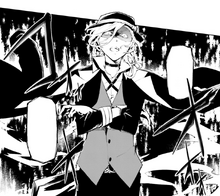
Chūya showing his temperament on seeing Dazai.
On the surface, Chūya is a temperamental and rather arrogant, blunt man. He revels in fighting, happy to show off his combative ability, and taking great pride in his reputation as the mafia's strongest martial artist. Taunting remarks pair with his pride, as he isn't above ridiculing his opponents in the middle of a fight. Befitting of an Executive, he has no qualms eliminating the Port Mafia's enemies by any means necessary, including murder, however, isn't nearly as homicidal in his tactics as members such as Ryunosuke Akutagawa and the members of Black Lizard tend to be.[5]
For as hot-headed as he may seem, Chūya isn't impossible to reason with. In fact, he's rather reasonable when no one is pushing his buttons. While his skills and presence signal an inherent threat, he's reliable enough for Mori to assign him the task of confronting the Armed Detective Agency during the three-way conflict involving the Guild.[6] It's true he didn't hesitate to retaliate and fight back against Akiko Yosano and Kenji Miyazawa (in fact, he takes great pleasure fighting against people that put up a good fight), but as soon as Yukichi Fukuzawa addresses him for more information, Chūya disengages from the battle. Here as well, his nature as a mafioso shines through, expressing no remorse for the danger the mafia intentionally put Naomi Tanizaki and Hirako in, using them as bait. In fact, he's rather smug about it, knowing it angers the Agency immensely.[7]
Ruthless as he is, Chūya seldom takes people's lives for granted and knows the importance of compromise and rationality. He refrains from unnecessarily brutal methods when need-be, and has enough sense to know when enough's enough. Notable instances include his conflict with Arthur Rimbaud, the man responsible for attempting to kill him long before he joined the Port Mafia at age fifteen. Chūya fully intended to kill him, but heard Rimbaud's last words without malice nor mockery. In fact, Rimbaud's final words for him had a deep effect on Chūya's own outlook on life and himself. He receives Rimbaud's hat as an entry gift to the Port Mafia and takes good care of the hat as a result.[1]
After Osamu Dazai "mercy killed" an enemy, only to repeatedly shoot and laugh at the corpse, Chūya demanded he stops, seeing no sense in Dazai's actions. Chūya's grudge against Ango Sakaguchi does not stop him from acknowledging the fact he owes the man a favor, and as such refrains from antagonizing Ango (and, by extension, his subordinate Mizuki Tsujimura) until he can repay his debt.[8]
Just as Chūya took his responsibility defending Sheep's well-being from their enemies, this holds true for his loyalty and devotion to Port Mafia after joining. So as reasonable as he may be, his top priority is Port Mafia's prosperity and well-being, thus nothing will stop him from fulfilling his responsibilities as an Executive even at the cost of other's lives. Fierce in his loyalties, Chūya finds betrayal intolerable and treats his subordinates quite well.[1]
In the past, Chūya struggled greatly with his identity and place in humanity. His connection to Arahabaki ended in him questioning how human he truly was, worsened by not knowing the truth behind why he was freed from the government's possession in the first place. While his strength lies in his ability, the awareness of a god's effects on him left him feeling as though he wouldn't feel worried nor fear in a fight, knowing he'd most likely win without a scratch. He attributed this to being - in his mind - inhuman, and thus unable to understand the depth of such emotions.
In order to give himself a sense of restraint, he preferred kicking largely over throwing fists, never even removing his gloves. He figured if he came to a fight where he had to remove his gloves, it was because he could no longer enjoy the rush of a battle, and genuinely needed to defend himself - in other words feeling an attachment to the life he lived, even if he felt like a foreign soul in a shell, rather than a human being. This holds true to the present, as Chūya's only seen removing his gloves when using Corruption in dire moments.
After Rimbaud elaborated his own beliefs on humanity, Chūya had a bit of a change of heart, taking his own life a bit more seriously. The Sheep's betrayal affected him greatly, alongside Port Mafia's direct involvement in uncovering the truth of his origins, but ultimately led to his loyalty in them. The drive for learning more about himself contributed largely to his rise in rank, much faster than anticipated.
Chūya's ultimate downfall is his intense disdain and hatred for Dazai. The two never got along, with Chūya instantly hating Dazai's underhanded, warped strategic personality. Dazai has always gone out of his way to dehumanize and ridicule Chūya, constantly attacking his pride and even driving Sheep to abandon and betray him in the past. Even now, the slightest insult from Dazai will set Chūya off on a tangent, taking full advantage of his quick temper and pride. This makes it easy to distract Chūya from tasks at hand. Nonetheless, as part of Twin Dark's nature, Chūya acknowledges Dazai's role as the tactician, extending minimal trust in at least knowing that Dazai knows how to effectively overcome a situation.
Ability
- Main article: Upon the Tainted Sorrow
His ability, Upon the Tainted Sorrow (
| Upon the Tainted Sorrow ( | ||

|
Manga Debut: | Chapter 22 |
|---|---|---|
| Anime Debut: | Episode 18 | |
| Ability: | Gravity Manipulation | |
Battles
- Main article: List of Battles
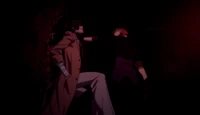
|
Osamu Dazai vs. Chūya Nakahara | Unsettled |
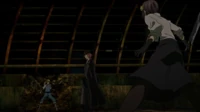
|
Kenji Miyazawa and Akiko Yosano vs. Chūya Nakahara | Unsettled |
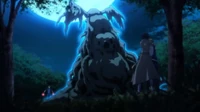
|
Chūya Nakahara and Osamu Dazai vs. John Steinbeck and Howard Phillips Lovecraft | Win |

|
Armed Detective Agency vs. Hunting Dogs | Partially Won |
Appearances
- Chapter 10 - Detective Boys
- Chapter 11 - Back in the Day...
- Chapter 16 - Constantly Pushed to the Past, Part 2
- Chapter 19 - The Three-Way Battle
- Chapter 21 - The Brother and the Devil
- Chapter 22 - The Strategy of Conflict
- Chapter 29 - Even If My Head Be Mistaken
- Chapter 30 - The Silent Tower and the Raven's Feast
- Chapter 31 - The Twin Darkness
- Chapter 37 - Closing the Party
- Chapter 46 - The Masked Assassin
- Chapter 47 - Mutual Destruction, Part 1
- Chapter 49 - Mutual Destruction, Part 3
- Chapter 53 - Echo, Part 3 (flashback)
- Chapter 62 - Dogs Hunt Dogs, Part 4
- Chapter 76 - Skyfall, Part 3 (image)
- Chapter 85 - Hero vs. Criminal, Part 2 (flashback)
Vampire Infection Outbreak Arc
- Chapter 98 - The Empty Port, Part 7
- Chapter 101 - Sinking to the Bottom
- Episode 9 - The Beauty Is Quiet Like a Stone Statue
- Episode 10 - Rashomon and the Tiger
- Episode 12 - Borne Back Ceaselessly into the Past
- Episode 17 - Three Companies Conflict
- Episode 18 - The Strategy of Conflict
- Episode 20 - Though the Mind May Be Wrong
- Episode 21 - Double Black
- Episode 24 - If I May Shed Away My Burden Now
- Episode 26 - Dazai, Chūya, Fifteen Years Old
- Episode 27 - The God of Fire
- Episode 28 - Only a Diamond Can Polish a Diamond
- Episode 33 - The Masked Assassin
- Episode 34 - Cannibalism (Part 1)
- Episode 35 - Cannibalism (Part 2)
- Episode 43 - Tragic Sunday (cameo)
Quotes
- (To Mizuki Tsujimura) "Do you know when it's alright to chicken out and go home? There is no such time."[8]
Etymology
- The name Chūya means "inside" (中) (chu/naka) and "to be" (也) (ya).
- The name Nakahara means "inside" (中) (chu/naka) and "plains" (原) (hara).
Namesake
- Main article: Real-life References#Chūya Nakahara
Chūya Nakahara (April 29, 1907 – October 22, 1937)
|
Trivia
- The real life Chūya Nakahara's birthname is Chūya Kashimura (柏村 中也).
- In BONES' anime adaptation, his hat chain and the belt at his side are omitted, and his vest is depicted as grey. He also has blue eyes.
- The chanting required in order to activate Corruption originates from a stanza in "Sheep Song",[10] a poem from Chūya Nakahara to Yoshihiro Yasuhara. "Sheep Song" later becomes the origin of his former group, the Sheep.
- He taunts Dazai as an "enemy of women". This might be due to Dazai's womanizing habits.[11]
- His Japanese voice actor, Kishō Taniyama, is the singer of GRANRODEO who sung the OP theme of Bungo Stray Dogs season 1 - TRASH CANDY. GRANRODEO later sang again for DEAD APPLE's OP theme, Deadly Drive, and season 3's OP theme, Setsuna no Ai.
- Despite liking alcohol, he tends to get drunk pretty easily.[12]
- He smokes on rare occasions. Mostly when stressed and irritated.[12]
- Arahabaki is an ancient Japanese god shrouded in mystery, its origins and historical relevance drenched with unreliable, scattered accounts. One theory considered it a sort of "guest god", on or lower a level of power of the main of a shrine it manifests in.[13]
Notes
- ↑ Studio BONES changes them to blue in the anime adaptation.
References
- ↑ 1.0 1.1 1.2 Bungo Stray Dogs: DEAD APPLE (Light Novel).
- ↑ 2.0 2.1 2.2 2.3 2.4 2.5 2.6 Bungo Stray Dogs Manga: Volume 6.
- ↑ 3.0 3.1 Bungo Stray Dogs Official Guidebook Tenkaroku.
- ↑ Bungo Stray Dogs Manga: Chapter 98.
- ↑ Bungo Stray Dogs Manga: Chapter 10.
- ↑ Bungo Stray Dogs Manga: Chapter 21.
- ↑ Bungo Stray Dogs Manga: Chapter 22.
- ↑ 8.0 8.1 Bungo Stray Dogs: DEAD APPLE (Film).
- ↑ Bungo Stray Dogs Manga: Volume 3, Author Guide.
- ↑ The Moon, and: Sheep Song. Project MUSE.
- ↑ Bungo Stray Dogs Manga: Chapter 31.
- ↑ 12.0 12.1 Bungo Stray Dogs Manga: Volume 4, Omake.
- ↑ 謎の神 アラハバキ § 民俗学からみたアラハバキ. Act9 — Katsuhiko Takahashi official site (in Japanese).



